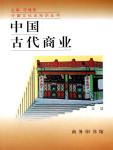Chapter 1 Chapter One: The Beginning of Germination, the Beginning of Growth—Exchange and Commerce from Ancient Times to Xia, Shang and Western Zhou Dynasties
Commerce comes into being gradually after the productive forces have developed to a certain level and there is social division of labor and a surplus of products.Its initial embryonic state is the direct barter exchange between producers, and then the developed form of exchange—commercial.
The earliest exchange occurred in primitive society.Six or seven thousand years ago, seashells (for decoration) were found in coastal villages belonging to the early Yangshao culture in Henan, Gansu, and Shaanxi. This is the physical evidence exchanged from other places.The exchange at that time was still accidental.In the late primitive society 5,000 years ago, animal husbandry and planting were divided, and handicrafts (pottery, bronze) were separated from agriculture one after another, and exchanges expanded accordingly. "Yi Xici Xiazhuan" said: "Shen Nong's work,...the day and China are the market, to the people of the world, gather the goods of the world, trade and return, each gets his own place", which means that the exchange has been relatively frequent, and there are fixed time and place.There is also a legend in ancient books that "the well is the market", and transactions are often carried out beside the well, so as to draw water for people and animals to drink or wash the goods.Therefore, later generations often refer to "market wells" together.
At the beginning of the exchange, it took place between clans and tribes with different production categories and natural conditions and different products. The leaders of the clans and tribes represented the exchange with the outside world.Shun, the leader of the Youyu tribe, is a famous historical figure who is good at engaging in exchange activities.It is said that Shun once "made utensils in Shouqiu (now Qufu, Shandong), and it was in negative summer (near Puyang, Henan)" ("Historical Records The Book of Five Emperors"). "Just in time" means taking advantage of the time to trade for profit.It is also said that Shun "sold in Dunqiu"; "Dunqiu bought expensive, so he sold in Dunqiu; Chuanxu sold cheap, so he owed Chuanxu." ") Dunqiu is in Junxian County, Henan Province, and Chuanxu is in Yuncheng, Shanxi Province.Dunqiu lacks some items, so it is "expensive to buy", and Shun sells the items needed by people here-mainly the special products of the Shun tribe, high-quality pottery, and other "special utensils"; while there are many local products in Chuanxu, So "sell cheap", Shun bought those products on credit (debt) there-mainly the pond salt from Hedong.Shun took advantage of the high and low of things in the two places to profit from it.In order to control the salt in Hedong Chi, after Shun became the successor of Shangyao, he moved the political center to Puban near Yanchi (named Jiechi).There is still a Shun Temple in Puban City today, and Xieyu County (now Yuncheng) where Yanchi is located has the word "Yu", which is also related to Shun.During Shun's reign, he made more efforts to develop salt production.According to legend, Shun made a five-stringed zither, played the qin, and sang poems about the south wind: "The fragrance of the south wind can soothe the sorrow of our people; the time of the south wind can enrich the wealth of our people." (See "The Collection of Ancient and Modern Books." "Food Code Salt Law") In summer, when the smoky wind comes south in time, the pool salt will naturally crystallize, and the wealth of the tribe will increase. Shun, who has always benefited from the exchange of salt, must of course make great efforts to ensure the quality of the pool salt production. of concern.
Shun ordered Yu to control the flood. Yu tried to organize the adjustment of grain among regions, and through the exchange, he solved the living problems of the people after the flood. "Shangshu" records what Yu said, "Whether there is a move or not, change the residence, and the [zheng] people are grains", which refers to this matter.Mao (trade) relocation means trade; Huaju means "trading what you live in", that is, using what you have, changing what you don't have, "adjusting what you have and giving it to you";Later generations called doing business as "Maoqian Youwu" which originated from this.
The exchange originally started between different clans and tribes, and the exchange of items within the same clan and tribe occurred later.Because making pottery, bronze, and jade requires relatively specialized production technology, long-term fixed operators and suitable raw materials, some clans, families and even families in the tribe have gradually become clans, families and families that specialize in a certain handicraft industry. Households; livestock are increasingly being herded by individual families or kept within homes.So far, exchanges have taken place not only externally, but also within tribes and clans.The emerging families and clan leaders who took advantage of the exchange and held power continued to get rich; the exchange also promoted the development of the individual family economy and became an important means for them to accumulate wealth.All these have opened a gap for the gradual formation of private ownership and the gradual disintegration of primitive society.It can be said that exchange is actually a catalyst to promote privatization and disintegrate the public property system.After Yu died, his son Qi took over the throne, established the Xia Dynasty, and established the slavery state.
During Yao and Shun times, pearls and jade were used as currency, and livestock, production tools, etc. became the general medium of exchange. "Xiahou uses Xuanbei", the Xia Dynasty used seashells (dyed black) as currency, and shell coins have been widely used since then until they were replaced by metal coins.From barter exchange to exchange medium - the emergence of currency is a sign of the forward development of exchange.In the original barter exchange, buying and selling happened at the same time and in the same place. With currency, buying and selling are decomposed into two different processes.

